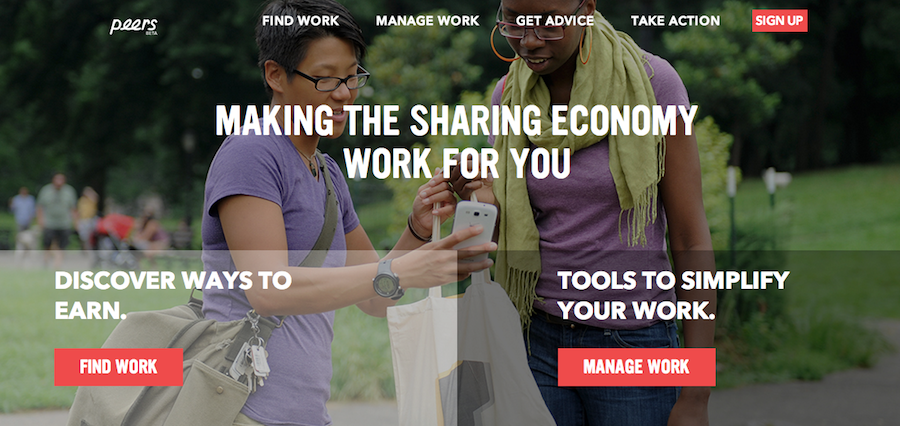Today, sharing economy nonprofit Peers launched a new website designed to make working in the sharing economy easier. Among the features on the new site are tools to discover and connect with work opportunities, reviews of sharing economy platforms from other independent contractors, information about earning potential, and a community forum.
Shareable checked in with Shelby Clark, the new executive director of Peers, to learn more about the vision for the site, the challenges sharing economy workers face, and what’s next for the organization.
Shareable: Hot on the heels of you being named the new executive director at Peers, there’s a new website up, designed to empower those working in the sharing economy. What inspired the site and what’s the vision for it?
Shelby Clark: I’ve been really interested in the way the sharing economy is impacting work for a while now. I first got involved in the sharing economy at Kiva.org, where I was one of the first employees, and I saw how crowdsourced debt capital was able to impact someone’s life by helping them invest in their micro-enterprise. Then I founded RelayRides, and while the initial motivation was to give people access to cars, it became really exciting to hear stories of people who really appreciated the extra income they were getting, and creating their own micro-enterprise leveraging their car as an asset. In both cases technology was connecting people, and in both cases that connection was impacting someone’s earnings in a real way.
While most sharing economy companies were created around the ideas of sharing something or creating access to something that was previously inaccessible, we are seeing people using the sharing economy to earn money using what they already have, and either supplementing or replacing other work. That’s incredibly interesting to me, because I don’t think we’re anywhere near knowing what the full potential of this is.
Why, at this point in the sharing movement, is such a resource or tool necessary?
Until now, much of the way people earned in the sharing economy was thought of as gigs or as extra money on the side, but more and more we are hearing about people who actually rely on these earnings. As we recognize that this is important income for people, we have to simultaneously recognize that this is more than a gig, this is something that people are viewing as their work, and as such it is their work. The sharing economy is redefining what we consider work to be.
The new site helps people discover sharing services that their skills, assets and interests align with, beyond giants such as Airbnb, Lyft and Uber. Why is this important? What other types of sharing services does the site connect people with?
 This is actually one area that is really exciting and that we got great feedback from in our focus groups over the summer. We met with members in several cities across the US, and spoke with people using the sharing economy as work while in-between jobs. We asked which platforms they were earning on, and heard a lot of "Airbnb" and "Uber," but when we threw out some names of some of the lesser known platforms like DogVacay or Feastly, people were really excited to learn about new ways to earn that they’d never heard of. It just needs to be easier to find out all the ways to earn with what you have, and our Income Discovery tool does just that.
This is actually one area that is really exciting and that we got great feedback from in our focus groups over the summer. We met with members in several cities across the US, and spoke with people using the sharing economy as work while in-between jobs. We asked which platforms they were earning on, and heard a lot of "Airbnb" and "Uber," but when we threw out some names of some of the lesser known platforms like DogVacay or Feastly, people were really excited to learn about new ways to earn that they’d never heard of. It just needs to be easier to find out all the ways to earn with what you have, and our Income Discovery tool does just that.
Another aspect of the site is helping people navigate the legal and financial areas of the sharing economy. This is a timely and potentially very valuable tool. Do you see the site becoming the go-to resource to navigate these issues? What would that look like?
Yes, we absolutely see Peers becoming the go-to resource to navigate these issues. Becoming an independent contractor for the first time is hard enough, let alone in an emerging industry with a constantly changing regulatory environment. And that’s why I have so much respect for workers who are out there figuring it out and making it work for them.
There is a growing community around the sharing economy, of people working in it, people interpreting the laws around it, people collecting data to understand its impact, and people just generally interested in its success as something that can have real, positive social impact. The more we collaborate and share what we learn, the easier we can use that information to make the sharing economy work for us.
Focus groups with Peers members illustrated that there are numerous challenges to working in the sharing economy. What are some of the biggest challenges sharing solopreneurs face? How will the site help address these challenges?
There are two main messages we heard from our members during the focus groups we ran over the summer. Firstly, we spoke to many who were relying on income from the sharing economy, and they needed help figuring out where to work. There is a lot of marketing material available online, but do we know that people will earn as much as the platforms say they will earn? What are some of the ways to earn that people don’t know about, like cooking meals from their home? People need advice on where to work, and they primarily need it from others who are already doing it, to learn from their experiences.
Secondly, people told us they needed help managing their sharing economy business – tax help, legal help, and support with things like cleaning their homeshare space. There are a lot of services and tools becoming available that are designed specifically for sharing economy workers, but they can be hard to find. Members told us they needed one place to go, where they could see all the help they can get, and that grew into our Support Marketplace.
As you well know, ratings are an essential part of the sharing economy. The new site rates products and services in the sharing economy and also rates the experience of working with them. How do you see this changing the current landscape? What’s your goal for this particular element of the site?
The sharing economy relies on reputation: people are offering things they have outside of the traditional company structure, and so it is others’ ratings of their experience that defines whether or not someone will be a successful worker in the sharing economy. That philosophy goes full-circle: workers rely on the platforms that facilitate sharing economy work, and with new platforms popping up every week, workers have many choices when it comes to which platforms they earn on.
Our goal for the ratings is to make it easy for workers to learn what it’s like to work on a platform before they start working there, so they can decide if it makes sense for their income and lifestyle goals. Naturally, as we get increased transparency, it will be easy to identify issues that are challenging for a majority of workers on one platform, or even across many platforms, and this is an important first step in making changes that are necessary for the sharing economy to work for workers.
What’s next for you and Peers? What are you most excited about?
I’m an entrepreneur, and I love to build things, so I have to say I’m most excited about creating—and seeing the creation of—products for sharing economy workers that don’t already exist. The Support Marketplace is making that possible at scale for the first time, and I’ve already had many conversations with both companies interested in creating products for sharing economy workers, as well as platforms eager for these products to be made available to the workers using their platform. We’re setting the stage for real, challenging innovation to take place, and that always excites me the most.
Anything you’d like to add?
I’m really really excited to see people start to use the site, so I’d like to invite every worker to get started by rating the platforms they earn on. You are the experts, and we want to hear what you think. We believe this is your sharing economy, and we’re working hard to make it work for you, so create a free account and we will let you know about the announcements we have coming over the next few weeks.
##
Follow @CatJohnson on Twitter









